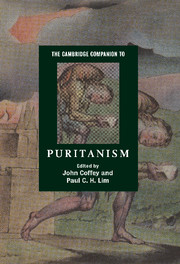Book contents
- Frontmatter
- Introduction
- Part I: English Puritanism
- Part II: Beyond England
- 6 Puritanism and the continental Reformed churches
- 7 The Puritan experiment in New England, 1630-1660
- 8 New England, 1660-1730
- 9 Puritanism in Ireland and Wales
- 10 The problem of Scotland’s Puritans
- Part III: Major Themes
- Part IV: Puritanism and posterity
- Index
7 - The Puritan experiment in New England, 1630-1660
from Part II: - Beyond England
Published online by Cambridge University Press: 28 November 2008
- Frontmatter
- Introduction
- Part I: English Puritanism
- Part II: Beyond England
- 6 Puritanism and the continental Reformed churches
- 7 The Puritan experiment in New England, 1630-1660
- 8 New England, 1660-1730
- 9 Puritanism in Ireland and Wales
- 10 The problem of Scotland’s Puritans
- Part III: Major Themes
- Part IV: Puritanism and posterity
- Index
Summary
In March of 1630, John Winthrop preached a lay sermon to the men, women and children who were gathered in Southampton to accompany him on a voyage to America, an errand into the wilderness where they planned to erect a new England. These emigrants were Puritans, departing England because of their belief that the assault on godliness being mounted by the king's bishops would only increase in vehemence. They had decided to uproot themselves and their families in order to found a colony where they could not only preserve the religious reforms they had managed to achieve in their native land, but also further advance the purification of worship and belief. This was not the only plan for Puritan colonisation, nor the best supported, which explains how a modest Suffolk landowner and justice of the peace could emerge as its leader. Providence Island for one, with its lists of investors that reads like a 'Who's Who' of the future Long Parliament, had more cachet. But it would be New England that would achieve the greatest success. In his sermon, later labelled 'A Model of Christian Charity', Winthrop reminded them of the social gospel they had heard many times before. They were, in the New World, to be knit together as one community, to 'partake of each other's strength and infirmity, joy and sorrow, weal and woe'. 'The care of the public must oversway all private respects.' They were entering into a covenant with God in which they pledged themselves 'to improve our lives' and 'to do more service to the Lord'. If they lived up to their obligations, 'the Lord will be our God and delight to dwell among us as his own people, and will command a blessing upon us in all our ways, so that we shall see much more of his wisdom, power, goodness and truth than formerly we have been acquainted with', and they would become 'as a city upon a hill'.
- Type
- Chapter
- Information
- The Cambridge Companion to Puritanism , pp. 127 - 142Publisher: Cambridge University PressPrint publication year: 2008
- 3
- Cited by



